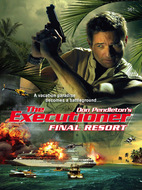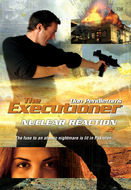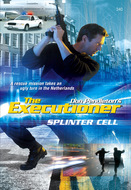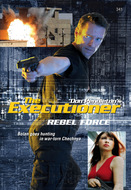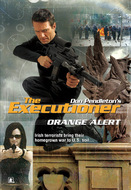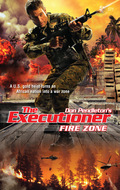Raamatut ei saa failina alla laadida, kuid seda saab lugeda meie rakenduses või veebis.
Loe raamatut: «Rebel Force»
A gunman came through the window screaming
The Executioner threw himself flat as a wild, ragged spray of rounds slapped out in his direction. He hit the pavement hard and grunted.
Bolan thrust his arm out straight and rolled over onto his side as he tried to target the charging man. Still firing, the man shuffled toward the nominal protection of a dented car. He went to one knee behind the bumper of the dark blue vehicle and brought his weapon to his shoulder.
Bolan didn’t hesitate. He rolled onto his stomach and took his Glock in both hands. His first shot hit wide of the gas hatch. His second punctured it. A jet of gasoline shot out in an arc and splashed the ground.
Bolan squeezed his trigger twice and put two more bullets through the bleeding gas tank. The second bullet ignited the flammable gasses trapped inside. A ball of flame erupted and was followed hard by a wave of concussive force. It was like hell on earth.
MACK BOLAN®
The Executioner
#266 Ultimate Price
#267 Invisible Invader
#268 Shattered Trust
#269 Shifting Shadows
#270 Judgment Day
#271 Cyberhunt
#272 Stealth Striker
#273 UForce
#274 Rogue Target
#275 Crossed Borders
#276 Leviathan
#277 Dirty Mission
#278 Triple Reverse
#279 Fire Wind
#280 Fear Rally
#281 Blood Stone
#282 Jungle Conflict
#283 Ring of Retaliation
#284 Devil’s Army
#285 Final Strike
#286 Armageddon Exit
#287 Rogue Warrior
#288 Arctic Blast
#289 Vendetta Force
#290 Pursued
#291 Blood Trade
#292 Savage Game
#293 Death Merchants
#294 Scorpion Rising
#295 Hostile Alliance
#296 Nuclear Game
#297 Deadly Pursuit
#298 Final Play
#299 Dangerous Encounter
#300 Warrior’s Requiem
#301 Blast Radius
#302 Shadow Search
#303 Sea of Terror
#304 Soviet Specter
#305 Point Position
#306 Mercy Mission
#307 Hard Pursuit
#308 Into the Fire
#309 Flames of Fury
#310 Killing Heat
#311 Night of the Knives
#312 Death Gamble
#313 Lockdown
#314 Lethal Payload
#315 Agent of Peril
#316 Poison Justice
#317 Hour of Judgment
#318 Code of Resistance
#319 Entry Point
#320 Exit Code
#321 Suicide Highway
#322 Time Bomb
#323 Soft Target
#324 Terminal Zone
#325 Edge of Hell
#326 Blood Tide
#327 Serpent’s Lair
#328 Triangle of Terror
#329 Hostile Crossing
#330 Dual Action
#331 Assault Force
#332 Slaughter House
#333 Aftershock
#334 Jungle Justice
#335 Blood Vector
#336 Homeland Terror
#337 Tropic Blast
#338 Nuclear Reaction
#339 Deadly Contact
#340 Splinter Cell
#341 Rebel Force
The Executioner®
Rebel Force
Don Pendleton

Cowards falter, but danger is often overcome by those who nobly dare.
—Elizabeth I, 1533–1603
People acting out of cowardice make mistakes. When they do, I will be ready to take action.
—Mack Bolan
THE MACK BOLAN LEGEND
Nothing less than a war could have fashioned the destiny of the man called Mack Bolan. Bolan earned the Executioner title in the jungle hell of Vietnam.
But this soldier also wore another name—Sergeant Mercy. He was so tagged because of the compassion he showed to wounded comrades-in-arms and Vietnamese civilians.
Mack Bolan’s second tour of duty ended prematurely when he was given emergency leave to return home and bury his family, victims of the Mob. Then he declared a one-man war against the Mafia.
He confronted the Families head-on from coast to coast, and soon a hope of victory began to appear. But Bolan had broken society’s every rule. That same society started gunning for this elusive warrior—to no avail.
So Bolan was offered amnesty to work within the system against terrorism. This time, as an employee of Uncle Sam, Bolan became Colonel John Phoenix. With a command center at Stony Man Farm in Virginia, he and his new allies—Able Team and Phoenix Force—waged relentless war on a new adversary: the KGB.
But when his one true love, April Rose, died at the hands of the Soviet terror machine, Bolan severed all ties with Establishment authority.
Now, after a lengthy lone-wolf struggle and much soul-searching, the Executioner has agreed to enter an “arm’s-length” alliance with his government once more, reserving the right to pursue personal missions in his Everlasting War.
Contents
Chapter 1
Chapter 2
Chapter 3
Chapter 4
Chapter 5
Chapter 6
Chapter 7
Chapter 8
Chapter 9
Chapter 10
Chapter 11
Chapter 12
Chapter 13
Chapter 14
Chapter 15
Chapter 16
Chapter 17
Chapter 18
Chapter 19
Chapter 20
Chapter 21
Chapter 22
Chapter 23
Chapter 24
Chapter 25
Chapter 26
1
The factory sat on the banks of the Sunzha River. As silent as a mausoleum, the building was surrounded by warehouses and industrial structures all bombed to rubble in the wake of the second Chechen war. An expensive black Mercedes sat abandoned in the half-acre parking lot. The sky was starless under close cloud cover. Rain fell, dirty gray from the sky.
Mack Bolan drew his mouth into a tight line. He scanned the building and the area around it through his night-vision goggles. He searched for telltale smeary silhouettes in the monochromatic green of the high-tech device but saw nothing. Even the engine block on the Mercedes was cool. The sounds of traffic came to him from other areas of the city, muted across the distance. Close by, his ears detected only the whisper of cold wind skipping across the polluted river.
Bolan scrutinized the building, determining his approach. To the rear of the building loading docks with big roll-up bay doors sat shut and locked. The front of the building was made up of wide glass windows, and revolving doors that led into the company front offices. If Bolan approached from that direction, he’d have his back to the access road and an impossibly wide front to cover.
On the side of the building closest to him a maintenance door was set at the top of a short flight of concrete steps. Off in the distance, Bolan heard the rotors of a helicopter cruising low over the city. The Executioner’s finely honed battle instincts whispered to him. Danger lay on every side.
The Mercedes, parked in the open, with no attempt at concealment or subterfuge in a city under martial law, was an enigma. Bolan wanted to be the wild card, not have some high-end vehicle fill that role. Sitting there, sleek and black and silent, it announced a human presence in a location supposedly long abandoned.
Bolan again scanned the area.
Grozny had been locked down under the threat of terrorist action by Chechen separatists. Police units patrolled in armored personnel carriers and army checkpoints secured every major road and highway leading into the city. Russia’s federal army worked hard at a three-point mission. Keep the oil flowing, keep the rebel insurgency suppressed and minimize troop casualties. Those protocols had resulted in an occupying force prone to using their weapons more than restraint.
Bolan knew he had taken a grave risk by going armed into the sovereign territory of an allied nation dealing with the threat of a violent insurrection. It was an insurrection with increasingly solidified ties to the worldwide jihadist movement. Moving incognito, Bolan had flown into Grozny using Associated Press credentials as Matt Cooper, freelance reporter.
Hal Brognola from Justice had secured the location of a cache drop used by CIA paramilitary teams during the Chechen wars. Slipping free from his state-sponsored monitors, Bolan had managed to get to the drop and secure money, equipment and a Kevlar armor vest, as well as personal weapons.
Bolan moved forward, scrambling out of the empty drainage ditch that ran parallel to the building. He approached a chain-link fence and dropped down, removing wire cutters from his combat harness. Using deft, practiced movements, Bolan snipped an opening and bent back one edge.
Bolan slid through headfirst and popped up on the other side. Traveling in a wide crescent, designed to take him as far as possible from the Mercedes, Bolan approached the maintenance entrance. He scanned the triple row of windows set above the building’s ground floor for any sign of movement. As he neared the building, Bolan pulled a Glock 17 from his shoulder rig.
Bolan crept up the short flight of stairs leading to the door, clicking the selector switch on his pistol off safety as he moved. Reaching the door, Bolan pulled a lock pick gun from a cargo pocket and slid it expertly home. He pulled the trigger on the locksmith device and heard the bolt securing the door snap back. Replacing the lock pick gun, Bolan put a hand on the door handle, holding his 9 mm pistol up and ready.
He thought about the intelligence intercept that had come through at the last moment. Because of strained relations with the Russian government over the Iraq war and the status of Iran’s nuclear program, the Oval Office had decided to keep America’s ally out of the loop. Enzik Garabend, an Armenian middleman responsible for financial networks and communications between disparate terror cells, was on his way to the Chechen capital. A meet had been planned with Kamir Abdhula Zanibar, head of a violent, Whabbism influenced, splinter militia of the main Chechen separatist movement.
In order to make use of the real-time information, Brognola had been forced to rush Bolan into place. Garabend was known never to be without his laptop. Encrypted inside of its software was believed to be a blueprint to the worldwide financial networks of the global jihad, linking Abu Sayef in Southeast Asia, with Islamic Jihad and al Qaeda in the Middle East, all the way to EU splinter groups and Chechen field commanders. It was a brass ring worth killing for.
Before he moved he took a final scan of his surroundings. The industrial wasteland was eerily still. Taking a breath, the Executioner turned the handle and pulled the door open. He stepped through the black mouth of the open door and into the darkened interior of the building. He shuffled smoothly to one side, sank into a tight crouch, pistol up, and let the door swing shut behind him.
Bolan quickly took in the hall in both directions. It was empty. Rising, he began moving down the corridor toward the rear of the building.
The building was oppressively still and quiet around him. The perimeter hallway ran the length of the structure, with doors leading to the building’s interior spaced at intervals along the inside wall. At the far end Bolan could make out the heavy steel of a fire door that would open to stairs.
The intelligence on the building layout had been spotty. The factory had served many functions over the years and had played little part in the Chechen insurrection or in Russian oil concerns. All Bolan knew was that Garabend, with his bodyguards, would be in an office suite on the second floor for seven hours before departing Grozny for Damascus.
Bolan entered the stairwell. He craned his neck, looking upward. Nothing moved on the stairs or crouched in the gloomy landings. He tracked his scanning vision with the poised muzzle of the Glock 17. The hair on the back of Bolan’s neck stood raised like the hackles of a dog.
The stale smell of dust and disuse was hanging heavy in the air. Faintly beneath that was the slight odor of machine oil coming up from the factory floor. Bolan’s straining ears detected nothing. He placed the reinforced soles of his boots carefully on the first metal rung of the building’s skeletal framed staircase and began to climb.
He edged around the curve of the stair. The raised grip of the pistol’s butt snuggled tightly into his palms. He kept his Weaver stance tight, keyed-up to react to the slightest motion. Garabend was an established veteran of life as a hunted man. Security so apparently lax was unexplainable in such a man.
Reaching the second-floor landing, Bolan snuggled up tight against the fire door. He pressed his back against the wall beside the door handle. The seal of the landing door was too tight for him to use a fiber optics surveillance cable borescope. The heavy steel door effectively muted any potential sound coming from the second-floor hallway.
Gritting his teeth, Bolan pulled the door open and darted his head around the edge. He was met with silence and darkness. The hallway ran for several yards, office doors on one side, dark windows facing the parking lot on the other. The hall turned in a L-break at the far end toward the front of the building.
Bolan moved down the center of the hallway, ready to drop prone or respond with deadly fire at the slightest threat. He moved as silently as his considerable skills allowed, but to his own adrenaline-enhanced hearing, his footfalls echoed loudly. Reaching the bend in the hallway, Bolan took a rapid look around the corner. Along this stretch, doorways marked both sides of the hall at intermittent lengths.
Halfway down he picked out a crumpled form. From the green smear under the still shape, Bolan could tell the figure had lost a lot of blood, and recently, as the signature still held a good amount of heat. Instinctively Bolan snapped his line of sight up, scanning the corridor for any sign of movement. Seeing none, Bolan slid around the corner and into the passage.
The heat register meant the downed figure was either still alive, or had been struck down just minutes before. Keeping low, Bolan moved forward. His nostrils flared under the saddle of the night-vision goggles. The reek of cordite was heavy on the stale air of the abandoned factory.
Going up to the body, Bolan looked it over quickly. The figure remained still. Reaching his free hand out, Bolan felt for a pulse on the figure’s neck, found none. He peered down, straining to make out facial features in the ambivalent light of the NVGs. The figure was male. A thick beard fell across a broad swell of chest. He was dressed in a Russian army pattern camouflage parka. There was a folding stock, paratrooper model AKS-74 under the man’s body.
Bolan touched the barrel. The metal was cool. The weapon had not been fired. Scanning the hallway, Bolan used his fingers to probe the corpse, trying to ascertain the source of his injuries. The face was intact, the torso clear of wounds. Frowning, Bolan felt the back of the man’s head.
His fingers came away wet.
The location on the back of the head where the spinal cord merged with the back of skull was the medulla oblongata, Latin for “stem of the rose.” Bolan knew it was the collective location for all of the nerves of the central nervous system. The hypothalamus hung there like a grape cluster, regulating breath and the beating of the heart. In the special operations community, a shot to the medulla oblongata was known as “popping the grape” and was a preferred method of neutralizing subjects from behind.
This hadn’t been a sloppy assassination. The dead man—Chechen, Bolan guessed, given the beard and Russian army jacket—had been coolly dispatched from up close and personal by someone with the nerves of a professional killer.
Bolan rose and stepped over the corpse. The man had been killed directly in front of a door on the outer side of the hallway. His intelligence information hadn’t been specific as to where on the second floor Garabend was supposed to be having his meeting.
“This mission is going to be very ad hoc, Striker,” Brognola had warned.
Bolan knew ad hoc was government speak for “half-assed.”
Bolan also knew that, in his War Everlasting, “half-assed” got you killed. But he felt, just as Brognola did, that the information on Garabend’s laptop was worth the risk. Worth his life even, if every drop of his blood was counted against the blood of innocents. Innocents Bolan had sworn his life to defend and avenge.
Bolan put his hand on the office door.
It swung open easily under his touch.
2
The Executioner glided into the room, pistol tracking ahead of him. The room was a reception area leading, presumably, to a private office farther back. The space had been stripped of furniture when the last owners of the building had pulled out ahead of the increasing violence and the brutal Russian air force. There were no pictures on the walls, no furniture or filing cabinets set up. Overhead, exposed wiring hung down like snakes from a ceiling stripped bare of light fixtures.
Bodies lay scattered around the room. In the heat sensitive night-vision goggles, the walls looked as if they had been splattered with florescent paint from the spilled blood. The reek of cordite was overwhelming in the tightly confined space. Spent shell casings pressed up against Bolan’s feet as he moved through the room. Four corpses were tossed with careless abandon around the enclosure.
More of the folding stock AKS-74s lay in hands quickly cooling in death. The office was a stinking abattoir filled with the stench of torn flesh and the copper tang of pooling blood. Bolan kept his eyes trained on the doorway leading into the inner recesses of the suite. His recon had revealed a surprising turn of events. It was time to adapt, to improvise, to overcome. Carefully, Bolan crouched. He secured an assault rifle by its pistol grip, tugging it free from its owner’s dead fingers.
Tucking the skeletal buttstock into his hip, Bolan ensured the safety was disengaged. Once outfitted, he holstered his Glock 17. Safely putting his pistol away freed his hands, and Bolan snapped down the folding stock of the paratrooper carbine to make it more manageable in the enclosed environment. Things were ugly now. The Executioner had been thrown a bloody curve ball, and he was determined to take it in stride.
There was an infrared penlight built into the goggles. When activated, it was like a flashlight in the lenses of the night-vision device, visible only in the infrared spectrum. Using it, Bolan quickly determined that Garabend was not one of the dead.
The soldier stood, slowly unfolding from the crouch he had used to navigate the room. The soles of his boots were tacky with blood. Keeping the AKS tight against his torso, he padded toward the door to the inner office.
Behind the office door came the end of the line. Secrecy and stealth became superfluous the instant he crossed through that final door. Bolan had every reason to suspect that he would find the corpse of Enzik Garabend inside. What he was less certain of, given the freshness of the kills, was whether or not he would find Garabend’s murderer in there as well.
Standing at an angle by the office door, Bolan surveyed it as carefully as he could through his NVGs. The door was closed. That seemed wrong. Once the target had been taken out, and considering the mess in the outer chamber, why go to the trouble of carefully closing a door behind you as you left?
The Executioner made his decision. Stepping forward, he raised up high on the ball of one foot and brought his right knee up to his chest where he held the AKS at port arms. Exhaling sharply through his nose, Bolan snapped his curled leg out with explosive power. He thrust through on the breaching kick, his big foot slamming into the door just inside of the handle, even to where the bolt ran in the lock housing.
The door popped open under the sharp force and swung wildly back. Bolan recoiled to one side in an attempt to avoid any returning fire from inside the room. After a heartbeat he tucked in behind the muzzle of his appropriated AKS and moved rapidly through the entrance. He swept the rifle muzzle around as he entered the room, his feet moving in a shuffling motion. His eyes sought the parameters of the room, seeing the contents of the chamber in terms first of motion, second in broad details of shape. He felt a breeze on his face, smelled the damp pollution stink of the Sunzha River bisecting Grozny.
A large desk dominated the middle of the room, a dark hulk in his goggles. The top of it glowed with a dripping luminescence. Behind the desk a body cooled as the night breeze blew in through a window blown to shards. Moving carefully, his nerves crackling with the electricity of potential danger, Bolan checked the corpse.
He reached down and unceremoniously yanked the dangling head up by a shock of greasy hair. In the IR enhancement light, the bland features of Enzik Garabend looked back up at him. The middle-aged man’s eyes bulged sightless from his death-slackened face. Bloody holes the size of coins riddled the man’s chest, ruining an expensive suit under a waterproof parka.
Bolan was too late.
Disgusted, he put a boot on the edge of the office chair and kicked it over in frustration. It slid a few inches and then toppled. The heavy, loose form of Garabend’s body slipped onto the floor with all the deftness of a sopping wet bag of cement. Out of professional habit, he quickly looked around on the floor for Garabend’s laptop, or any other effects. Nothing. The place had been stripped clean of all but the ex-terrorist’s corpse.
Now that he was sure of Garabend’s fate, Bolan knew he had to exit the scene as quickly as possible. The abandoned factory had become red hot. Too hot for a foreigner packing a military arsenal on Russian soil in a time of heightened attacks by a savage, determined insurgency. He had to get out of there, retreat to his safehouse and contact Brognola for extraction.
Suddenly Bolan froze. Some faint sound, almost inaudible on the periphery of his hearing, came to him. He cocked his head to the side, tense.
He couldn’t recapture the sound again, now that he was actively listening. In the graveyard silence that surrounded him, Bolan couldn’t be sure he’d heard anything to begin with. It was unsettling. The Executioner didn’t spook. He slowly sank onto one knee by the sprawled corpse of the Armenian terror merchant and ran an expert hand over the man’s body, fishing through his pockets.
Nothing.
Bolan turned and stood. It was then that the necessary angle of vision was correct. The battery light from Garabend’s satellite phone burned green, suddenly obvious in the gloomy room. Bolan frowned, head cocked, listening for any sound coming from outside the office. He heard nothing to give him pause and turned his attention back to the sat phone. Garabend’s phone was a good catch, not the same as his laptop, to be sure, but still good. It seemed hard to believe that professional operators capable of a hit of this magnitude could have possibly missed it.
Still, though the takedown had all the earmarks of top-line training, Bolan figured it couldn’t have been Russian Spesnaz teams. The entire site would have been locked down for the entry team. Intelligence technicians would have been crawling across the site post-action, searching for any evidence. Garabend’s bullet riddled corpse would have been whisked away and paraded on Russian television. After the Belsan school siege, dead terrorists made for great ratings from an angry, vengeance minded Russian nation.
Whoever had taken out Garabend had been a player; but not official Russian. Bolan picked up the phone. It was sticky with the dead man’s blood. Bolan powered the device off and placed it in a pocket of his nightsuit. The phone provided a clue, in and of itself. The high-tech devices made doing business in the modern age much, much easier, especially from remote or uncivilized areas, but they were a liability as well.
Worldwide, terrorists had learned a lesson a decade earlier, in the spring of 1996, from the death of Dzokhar Dudayev. The Chechen leader had known he needed to limit the time he spent using the satellite phone given to him by his Islamic allies in Turkey. The survivor of two Russian assassination attempts had been wary of Moscow’s ability to home in on his communication signal and thus his location.
But on the evening of April 21, Dudayev, baited by Russian President Boris Yeltsin’s offer of peace talks, called an adviser in Moscow to discuss the impending negotiations.
Dudayev stayed on the phone too long.
American spy satellites, trained on Iraq and Kuwait, were quickly turned north to the Caucasus Mountains and Chechnya, according to media reports by a former communications specialist with the U.S. National Security Agency—NSA—The satellites pinpointed the Chechen leader’s location to within feet of his satellite phone signal, and the coordinates were sent to a Russian fighter jet.
Dudayev was killed by two laser-guided air-to-surface missiles while still holding the phone that had pinpointed his location.
Had Garabend made the same mistake? Only instead of missiles, had a call he made triggered a hit squad or some lone, hyper-skilled, assassin? Whatever the case, Bolan had enough to go on for the moment. Once Aaron “the Bear” Kurtzman and his team got hold of the information in the communication device, they would have plenty of clues for further operations.
Bolan stepped around the desk and moved through the open door into the outer office chamber. The bodies of the dead Armenian’s bodyguards still lay sprawled around in haphazard disarray. After years of experience, Bolan had a critical, almost gifted, eye for crime-scene forensics. He was able to recreate the events of even the most horrific battle by the position of corpses, spent shell casings and blood spatter. In this case, rushed for time, he was unable to conclude whether this butcher’s work had been done by a coordinated team or a single, talented professional.
Bolan moved carefully through the room. He held his AKS at the ready as he approached the door. His feeling of disquiet had not subsided. He couldn’t place his unease, and that made it all the more bothersome. He stalked forward, pausing at the door leading out into the hall.
He stopped, sensed nothing, moved forward.
All hell broke loose.
Tasuta katkend on lõppenud.

